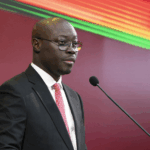
Finance Minister Dr Cassiel Ato Forson will today, Thursday, November 13, present the 2026 Budget Statement and Economic Policy to Parliament – a major policy moment that will reveal how the government intends to consolidate Ghana’s fragile recovery while responding to growing public expectations for relief and renewed growth.
For many Ghanaians, this budget goes beyond the usual fiscal exercise. It represents a test of direction — whether the government can sustain economic stability, meet its debt commitments, and still deliver tangible benefits in jobs, infrastructure, and social protection.
Balancing Stability and Growth
Dr Forson faces the delicate task of balancing fiscal consolidation with growth. He is expected to anchor his presentation on three core objectives — maintaining stability, improving revenue mobilisation, and supporting inclusive development.
Having previously served as deputy finance minister and now leading fiscal policy through a difficult post-debt-restructuring period, Dr. Forson is known for his technical grasp of the numbers and his preference for credible, data-driven projections. Analysts expect today’s statement to focus on realistic targets for growth, inflation, and the fiscal deficit, along with clear policy measures to keep Ghana on a sustainable path.
The 2026 budget will be closely watched for signals that the government can manage limited fiscal space without undermining recent gains in exchange rate stability and inflation control.
New Revenue Measures on the Horizon
Revenue remains the biggest constraint on Ghana’s fiscal performance. While expenditure cuts have been consistent in recent years, domestic revenue growth continues to lag behind projections.
Today’s presentation is therefore expected to outline new revenue measures — possibly through the expansion of the tax net, improved compliance enforcement, and digital taxation reforms. However, Dr. Forson is also under pressure to avoid imposing new burdens on citizens and businesses already strained by high living costs.
The focus, according to analysts, may shift toward administrative efficiency — plugging leakages, enforcing existing laws, and digitising revenue collection rather than introducing broad-based tax hikes.
Spending Priorities and Social Commitments
On the expenditure front, the Minister is expected to reaffirm the government’s commitment to protecting spending in education, health, and social protection — sectors that directly affect livelihoods and have a strong public interest appeal.
Job creation will likely remain a central theme, with renewed attention to supporting SMEs, manufacturing, and agriculture as engines of employment. Infrastructure — particularly roads, water, and energy projects — is also expected to feature prominently, though within a more disciplined financing framework.
Observers say the government will have to demonstrate how it intends to balance these spending commitments with its pledge to keep the deficit under control.
Debt, Deficit, and the IMF Framework
The 2026 budget also serves as a progress update to Ghana’s development partners, including the International Monetary Fund (IMF), which continues to anchor the country’s fiscal recovery efforts.
Dr Forson is expected to reaffirm the government’s commitment to the IMF programme’s key benchmarks: reducing the fiscal deficit, improving public financial management, and maintaining transparency in debt operations.
Investors and markets will be watching closely for a credible debt servicing strategy — particularly how the government plans to finance maturities and external obligations without excessive domestic borrowing. The credibility of these plans will influence investor confidence and the stability of the cedi in the months ahead.
Signals for Households and Businesses
For ordinary Ghanaians, the biggest concern remains the cost of living. Many will be looking for measures that cushion the effects of inflation and provide economic relief, whether through subsidies, targeted social programmes, or support for small businesses.
Businesses, on the other hand, will be looking for predictability — a stable macroeconomic environment, clear tax policy, and access to affordable credit. Any measures to reduce arrears, simplify tax compliance, or improve cash flow in the private sector will be warmly received.
A Budget of Credibility and Confidence
Today’s budget presentation will test not just the government’s policy direction but also its credibility. Dr Forson will need to convince Parliament, investors, and the public that his numbers add up — and that his plans are realistic and achievable.
Beyond the statistics, Ghanaians will be listening for assurance that the government understands their daily struggles. The tone and substance of the presentation will determine whether this budget is seen as another technical document or a genuine roadmap for shared recovery.
As the Finance Minister rises before Parliament, the nation will be watching for more than figures. What Ghanaians expect is a message of discipline, hope, and direction — one that shows that stability can coexist with opportunity, and that fiscal prudence can still deliver progress.